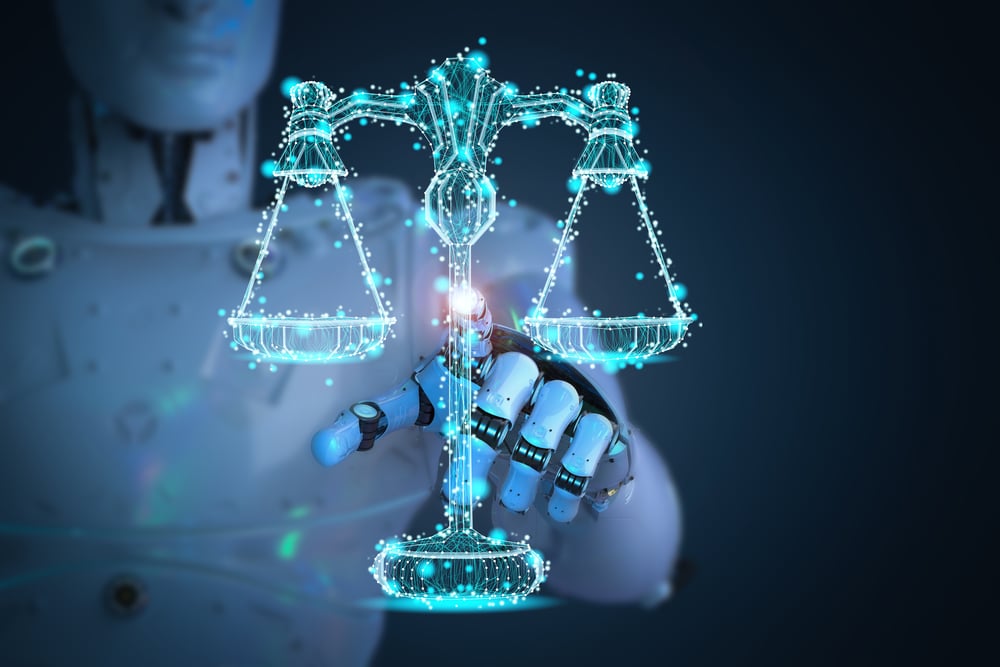How AI will shape the future of the legal industry

The Department for Science, Innovation and Technology (DSIT) announced a £6.4 million grant for small and medium-sized enterprises (SMEs) to invest in AI-technology skills-based training. This development is the latest in a string of AI funding initiatives across the UK corporate sector, indicating that 2024 is the year emerging technologies will revolutionize the workplace in all aspects.
AI technology is transforming business functions across industries. However, the legal sector, in particular, has demonstrated tremendous progress. Often portrayed as laggards when it comes to embracing innovation, legal’s cautious, conservative approach to tech adoption has become a thing of the past in the age of AI. A recent survey from the Legal Services Board (LSB) discusses how over 95 percent of legal businesses found that implementing new technologies has made them more responsive to clients’ needs. Moreover, 60 percent of surveyed legal businesses found their clients expect them to power their legal services through tech innovation.
It’s increasingly clear that the legal sector isn’t just on board with leveraging new technologies to deliver best practices for their enterprises and clients but rather carving its own path through investing in AI technologies. For instance, the industry is projected to spend £30 billion on AI software by the end of 2024.
Looking ahead, it is crucial for legal teams to understand how to meet their organizations’ needs while remaining competitive and profitable in today’s AI landscape. As the race to invest in AI intensifies, the industry must adapt and prepare for the future impact on the current and next generation of legal professionals, legal operations, and global regulations.
AI will shape legal education
With nearly 40 percent of legal operations professionals reporting discomfort or unease with gen AI tools, and an additional 33 percent feeling underserved by the technology available to them, the need for comprehensive AI education in the legal sector is pressing. Without the right guidance and skillset, legal professionals will struggle to stay relevant, competitive, and competent in today’s digital age.
Educational programs, whether aimed at attracting the next generation of professionals or retraining seasoned experts, must fully integrate AI-centric learning into the legal curriculum and practical day-to-day operations. This should include education on topics such as AI ethics and regulation, and in-depth training on AI solutions transforming the legal function. For example, learning how to leverage AI-driven contract management solutions to streamline contract review, negotiation, and post-signature management.
To support continuous learning and development, legal teams should also consider allocating budgets to enhance technical abilities related to AI solutions, cognitive skills for effective problem-solving and decision-making on technology adoption, and social skills that facilitate better cross-collaboration in an AI-driven environment. This could include partnering with legal tech companies for training on AI applications, building a network on online forums and professional associations, or attending AI-focused networking events. Additionally, legal teams could invest in integrating AI applications enterprise-wide. This dual approach ensures that legal professionals are prepared to use AI tools and continuously adapt to emerging technology.
AI will shape legal operations
The integration of AI into legal operations is becoming indispensable, according to the latest World Commerce and Contracting report. Furthermore, a recent Law Departments Operation (LDO) survey found that more than 85 percent of legal operations professionals believe that most law departments and legal businesses will make substantial use of Gen AI in the next three years.
Legal professionals can assert their leadership by embracing AI to address financial challenges, improve efficiency, and create greater value while upholding compliance standards. For example, automating contract-driven processes with AI enhances productivity for legal teams so they can spend less time on manual tasks like low-risk contract reviews and more time on strategic initiatives. With in-house counsel focused where it counts, this also enables reduced spend with third-party legal firms -- one of the largest line items in every General Counsel’s budget. The possibilities enabled by AI technology are empowering lawyers and legal operations teams to become sources of enterprise-wide digital transformation and strategic impact by extracting contract data at scale and making it accessible and actionable to business partners.
AI will shape global regulations
More than 40 percent of C-Suite leaders favor government regulations that prioritize responsibility and ethics over innovation. In March, the EU passed the AI Act, its first-ever legal framework on AI worldwide. The framework emerged amid a year of global elections and growing concerns about AI’s long-term effects on the workforce and the economy.
Legal leaders are tuned in to see how the EU AI Act will impact AI companies, particularly those that support large enterprises across Europe, to establish clear guidelines on how to deploy AI responsibly and securely. For AI companies like Icertis that equip legal teams with powerful, material business outcomes through gen AI, demonstrating trust and transparency to meet customers' evolving needs is paramount.
The legal sector plays a critical role in ensuring that the deployment of AI technologies adheres to newly established regulations, such as the EU AI Act, while supporting companies in managing the broader legal, ethical, and societal implications of AI integration. Digitally savvy and agile legal teams can effectively prepare for and ensure compliance in today’s regulatory landscape by incorporating emerging technologies like AI into their commercial agreements and operationalizing specific compliance requirements within each contractual relationship.
Conclusion
AI is revolutionizing the legal industry and turning in-house legal teams into drivers of innovation and value in this increasingly competitive landscape. Companies that recognize the strategic importance of AI technology in legal practices, acknowledge the ethical considerations it raises in today’s regulatory environment, and take proactive measures to adapt, will be best positioned to deliver significant value and stay ahead in the future.
Image credit: phonlamai/depositphotos.com

Shannon Kirk is Global Director of Legal Industry Solutions at Icertis.